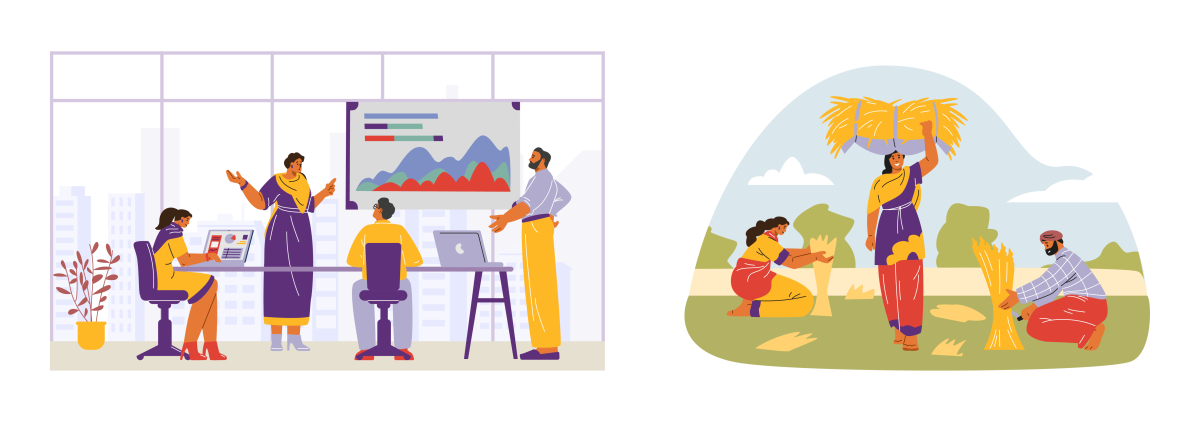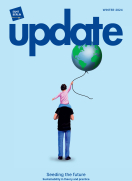Connecting data, policy, and people

By Tammi L. Coles
How do we ensure that sustainability is more than just a well-intentioned idea? The Forward Society Lab (FOS Lab) – co-directed by Rajshri Jayaraman, an associate professor at ESMT – focuses on how data and evidence can shape more sustainable practices. Through research-practice partnerships (RPPs), FOS supports partners in maximizing data use to address unique challenges and co-develop long-term, tested, and tailored solutions.
Sustainability, in its broadest sense, requires businesses, governments, and communities to work together. It’s about making informed decisions that respond to real-world needs and ensuring that these solutions positively develop. Projects at FOS Lab – from education initiatives in Puerto Rico to resilience-building in Brazil – do just that. The lab is committed to making sustainability work in practice, not just in theory.
Turning research into action
At FOS Lab, the guiding principle is that action must be informed by evidence. Academic insights are only useful when applied in ways that are tailored to real-world challenges. What’s needed is a seamless connection between data, people, and application. This is why FOS Lab research affiliates work alongside governments, businesses, and local communities to gather data and co-create solutions informed by evidence and grounded in the specific needs of those served.
Sustainability isn’t a one-size-fits-all concept. Every community presents a distinct set of challenges. To meet those challenges, FOS Lab uses an iterative model, working closely with stakeholders from the ground up. By identifying the unique barriers faced by communities, the Lab co-develops data-driven solutions that are tested and refined in real-time through constant feedback. This iterative process ensures that the interventions remain flexible and responsive to the changing needs of the communities they support.
Below are two examples that show how this collaborative and responsive model works in practice.
Puerto Rico – Education and emotional resilience through innovation
In Puerto Rico, the aftermath of hurricanes, economic instability, and the COVID-19 pandemic created an urgent need for sustainable solutions in education and emotional resilience. FOS Lab – represented by FOS co-director Gustavo J. Bobonis – partnered with local initiatives, including EDUGESPRO, Atemá, and Acemocion, to address these challenges through data-driven approaches focused on long-term sustainability for schools and communities.
The EDUGESPRO initiative provided school administrators with digital tools for resource allocation and teacher support, while Acemocion worked with students to enhance emotional resilience. FOS Lab measured the short-term and long-term effects of these interventions, tracking improvements in emotional well-being, educational performance, and administrative efficiency.
Initial results showed that students involved in Acemocion experienced reduced anxiety levels, while schools in EDUGESPRO reported better resource management and teacher satisfaction. These outcomes underscore the need for sustainable educational systems that balance technological innovation with emotional support to prepare students and educators for future challenges.
Brazil – Water access as a catalyst for autonomy
In Northeastern Brazil, water scarcity had historically been manipulated by local politicians to maintain control, with families dependent on intermittent access to water in exchange for political support – a practice known as clientelism. FOS Lab – represented by Bobonis andFOS research affiliates Marco Gonzalez-Navarro and Simeon Nichter – partnered with local researchers to evaluate the long-term effects of a government program that installed rainwater cisterns in rural communities. The research aimed to determine whether reliable access to water could disrupt this cycle of dependency and shift political dynamics.
The findings were striking. Families with cisterns became less reliant on political favors and felt empowered to vote independently. Data also showed increased community participation in local governance, illustrating how sustainable access to a basic resource like water can foster long-term political and social resilience. Local leaders played a crucial role in the program’s success, ensuring the cisterns were integrated into the communities’ broader resource management systems. Their involvement not only strengthened trust but also helped solidify the sense of ownership among residents.
Beyond the political impact, the consistent access to water also had economic benefits, allowing families to dedicate more time to farming and other income-generating activities. This shift contributed to greater economic stability and reduced the uncertainty that had plagued the region for decades.
Data-driven, human-centered
At FOS Lab, commitment to sustainability extends beyond implementing solutions—it’s about fostering long-term, adaptive engagement with the communities served. Jayaraman believes the true impact of FOS Lab’s approach is in the continuous integration of local feedback and lived experience. While data helps guide interventions, the ongoing collaboration with people that ensures that sustainability thrives in practice.
FOS Lab’s projects are seen as the start of an evolving partnership with communities, where progress is measured not only by metrics but by the strength of local ownership. In Brazil, for example, the installation of rainwater cisterns didn’t just provide water; it sparked a shift in local governance and economic stability. Similarly, in Puerto Rico, emotional resilience programs like Acemocion grew stronger because they were tailored to reflect the psychological realities of students navigating multiple crises.
Data insights in sustainability
Sustainability has become a buzzword in the business world. Research from FOS Lab highlights how organizations and communities are using data to focus on key sustainability efforts such as reducing waste, improving resource efficiency, and fostering transparency. These insights provide evidence on how data-driven strategies can guide decision-making processes related to resource allocation and operational efficiency. By leveraging data, organizations can explore potential pathways for balancing immediate pressures with long-term sustainability goals.
Sustainability as a shared journey
FOS Lab’s work shows that sustainability is a long-term process that involves continuous collaboration across sectors. Whether addressing educational initiatives in Puerto Rico or supporting political autonomy in Brazil, the challenges vary but are consistently addressed through evidence-based approaches.
At ESMT Berlin, future business leaders and policy experts are learning how data and evidence can inform sustainability practices. The institution emphasizes an ongoing process of learning, adaptation, and collaboration, equipping students with the skills to integrate data-drive sustainability solutions into business practices.
Everyone has a role to play in building a sustainable future. This requires leadership at every level – from the classroom to the boardroom, and through education, research, and action.
Tammi L. Coles
Senior Editor, ESMT Berlin
This article was originally published in ESMT Update Winter 2024 (PDF).
ESMT Update Winter 2024
